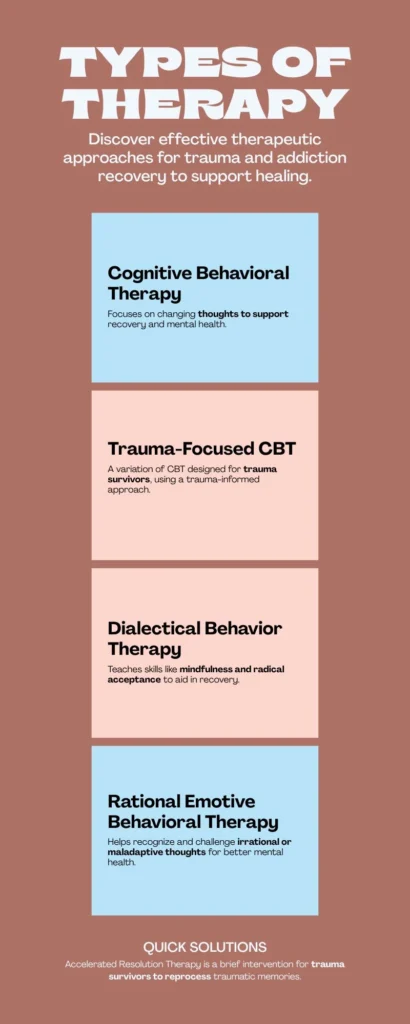Finding therapy for trauma and addiction recovery is essential, as trauma often contributes to substance use disorders. Roaring Brook Recovery in Kentucky offers evidence-based, person-centered treatment to help clients process trauma and overcome addiction through specialized programs such as Partial Hospitalization (PHP) and Intensive Outpatient (IOP). Their trauma therapy includes individual and group sessions, family therapy, and a variety of therapeutic approaches like cognitive behavioral therapy (CBT), trauma-focused CBT, dialectical behavior therapy (DBT), and accelerated resolution therapy (ART). Clients can also benefit from sober living options and an alumni program that provides ongoing support and community connection. By addressing both trauma and addiction, Roaring Brook Recovery aims to guide individuals toward comprehensive, lasting healing.
Finding Therapy for Trauma and Addiction Recovery
Finding therapy for trauma and addiction recovery can be crucial for people facing substance use disorders who have been through a traumatic or stressful event. Trauma is a known risk factor for addiction. Some people use substances to cope with the effects of conditions like post-traumatic stress disorder (PTSD). However, both addiction and trauma are treatable. At Roaring Brook Recovery, we use evidence-based approaches proven effective for treating trauma and substance abuse.
Finding therapy for trauma in addiction recovery does not need to be a challenge. Our team is here to help.
Trauma Therapy Program
If you are looking for trauma therapy for addiction recovery in Kentucky, Roaring Brook Recovery is an ideal solution. Our trauma therapy program provides trauma therapy for people going through addiction recovery. Through specialized care, clients process traumatic events, learn new coping and life skills, and develop a positive view of themselves. Trauma therapy is available at all levels of care at our center, which include partial hospitalization and intensive outpatient treatment programs. We’ll help you determine the right starting level of care for you during the intake process.
Partial Hospitalization Program
Our partial hospitalization program (PHP) is a common starting level of care. PHP at Roaring Brook Recovery meets five days per week for about four hours per treatment day. On treatment days, you’ll participate in groups, individual therapy sessions, and other activities (e.g., family therapy) that will support your recovery from trauma and addiction. Individual therapy gives you the chance to talk about trauma and addiction-related concerns privately with a mental healthcare professional, whereas groups provide a chance to share your experiences and find a sense of connection with other individuals in your program.
IOP in Lexington, KY
Our intensive outpatient program (IOP) in Lexington, KY, uses the same effective approach as our PHP. However, a reduced time commitment is required, providing IOP clients with more time to balance external responsibilities, like work or college classes, with addiction and trauma therapy. IOP clients come to treatment four days per week for about three hours per day. You can start your treatment journey at Roaring Brook Recovery in IOP, or you can step down to IOP after completing PHP for continued care.
Sober Living Kentucky
Roaring Brook Recovery clients have the option to live at home or in one of our sober living houses while in treatment. By offering sober living in Kentucky for clients, we make it easy to get to therapy sessions. However, that is not the only benefit. Sober housing increases accountability and structure while providing a sense of community that can be crucial during the recovery process.
Alumni Program
Healing takes time. That’s why our alumni program provides continued support for former clients. Participation in an alumni program provides access to resources such as check-ins and continued support from treatment staff, social events, a sense of community (which can be vital for trauma survivors and those healing from addiction), and opportunities for continued growth. For example, educational workshops and career development.
What Types of Therapy are Used for Trauma and Addiction Recovery?
What types of therapy are used for trauma and addiction recovery? We use a blend of therapeutic modalities proven effective for trauma and addiction, which may include but are not at all limited to:
- Cognitive behavioral therapy (CBT). CBT focuses on changing your thoughts to make them more productive and supportive of your recovery and mental health.
- Trauma-focused CBT (TF-CBT). Trauma-focused CBT is a variation of CBT for trauma survivors, conducted via a trauma-informed lens.
- Dialectical behavior therapy (DBT). Therapies like DBT teach skills, like mindfulness and radical acceptance, that can be helpful during the recovery process.
- Rational emotive behavioral therapy (REBT). Derived from CBT, REBT can help you recognize and challenge irrational or maladaptive thoughts.
- Accelerated resolution therapy (ART). Developed for trauma survivors, ART is a brief form of therapy that can help you reprocess traumatic memories.
Our programs also offer neurofeedback, breathwork, art therapy, 12-step, and recreational activities, like hiking. Combining multiple treatments enables clients to develop a comprehensive set of new skills while gaining enjoyment and confidence in the recovery process.
Call Roaring Brook Recovery for Trauma and Addiction Therapy in Kentucky
Roaring Brook Recovery provides person-centered and evidence-based addiction recovery services. Addressing trauma as an underlying cause and contributing factor to addiction is critical when applicable to the client, and we are committed to helping each individual in our programs achieve whole-person recovery. Call Roaring Brook Recovery for trauma and addiction therapy in Kentucky at (859) 780-7410 today.
Frequently Asked Questions (FAQs)
Do you provide dual-diagnosis treatment?
Yes. As an addiction and mental health treatment center in Kentucky, we provide standalone addiction treatment, standalone mental health treatment, and dual-diagnosis treatment for individuals experiencing both addiction and co-occurring disorders. This includes trauma disorders, like PTSD.
Is trauma and addiction therapy covered by insurance?
Yes. Your health insurance plan should help you cover therapy for trauma and addiction. Roaring Brook Recovery accepts most forms of insurance and other payment methods. You can verify your insurance coverage for trauma and addiction treatment in Kentucky at our center by calling our admissions line.
What is the connection between trauma and substance abuse?
There’s a strong connection between trauma and substance abuse. Traumatic experiences are associated with the development of substance use disorders. For example, abuse, neglect, familial or social conflicts, and violence are all forms of trauma and stress linked to substance use disorder development. People who experienced trauma early in life (childhood or teen years) may be particularly susceptible to drug and alcohol abuse. However, there are effective treatments for trauma-related mental health concerns and conditions, as is the case with substance abuse.
What is the best type of therapy for trauma and addiction?
There are many effective therapies for trauma and addiction. Evidence-based treatments for trauma disorders like PTSD include but aren’t limited to therapies like CBT and cognitive processing therapy (CPT). For substance abuse, approaches like 12-step and CBT are highly beneficial and effective. At Roaring Brook Recovery, we use a combined approach to help you get the benefits of multiple therapies for trauma and addiction.



